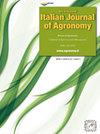新型种子压球技术及其对棉花出苗、产量和纤维质量的影响
IF 2.1
3区 农林科学
Q1 AGRONOMY
引用次数: 0
摘要
种子包衣是最重要的预处理方式。由于棉花是一种重要的经济作物,其种植成本和由此带来的经济效益无疑是需要考虑的重要方面。近年来,包衣材料的高成本和复杂的生产工艺阻碍了棉花种子包衣的广泛应用。此外,棉花植株从子叶萌发,种子萌发后,种皮上的包衣材料并不能发挥作用。鉴于上述缺点,为适应机械化直播方式,并将大量肥料和杀菌剂、杀虫剂与种子直播入土一起使用;同时,这将提高棉花出苗率、棉花出苗后的生理素质以及棉花幼苗初期的抗逆能力。在这项研究中,我们采用木薯淀粉、膨润土、硅藻土、芒硝和育苗基质等成分设计了一种棉花种子包球技术。我们通过生长室试验确定了该方法的成分比例,并通过田间试验评估了该方法在棉花整个生育期的效果。结果表明,与未包衣的对照组相比,包球棉花种子的萌发率和萌发孔率分别提高了 34.42% 和 28.84%。在棉花产量方面,种子包球处理增加了单株棉铃数和棉花总产量。种子包球技术不同于传统的种子造粒或种子包衣技术。它将一粒或多粒种子聚集在种球中,使同一作物可同时播种同一品种或不同品种的多粒种子。此外,种球还能促使种子携带肥料和农药进入土壤,进一步削弱土传病害和非生物胁迫,在土壤中形成相对稳定的内环境,确保棉花种子的发芽率。我们的研究结果为利用这项新技术提高棉花出苗率提供了参考。本文章由计算机程序翻译,如有差异,请以英文原文为准。
A novel seed balling technology and its effect on cotton emergence, yield and fiber quality
Seed coating is the most important type of pretreatment. Since cotton is an important economic crop, the cost of its cultivation and the resulting economic benefits are undoubtedly important aspects to be considered. In recent years, the high cost of coating materials and complex production processes have prevented the widespread application of cotton seed coating. Moreover, cotton plants emerge from cotyledons, and the coating material on the seed coat does not play a role after the seed emerges. Given the above shortcomings, to adapt to the mechanized direct seeding method and to include a large number of fertilizers and fungicides, insecticides can be used together with the seed direct seeding into the soil; at the same time, this will improve the cotton seedling emergence rate, the physiological qualities of cotton seedlings after the emergence of cotton seedlings, and the resilience of cotton seedlings in the early stage of resistance ability. In this study, we devised a technique for balling cotton seeds employing components such as cassava starch, bentonite, diatomite, attapulgite, and seedling substrate. The compositional ratios of the method were determined via a growth chamber trial, and we evaluated its effect throughout the cotton reproductive period using field trials. The results showed that the emergence and emergence hole rates of the balled cotton seeds increased by 34.42% and 28.84%, respectively, compared with the uncoated control. In terms of cotton yield, the seed balling treatment increased the number of bolls per plant and the overall cotton yield. Seed balling technology is different from traditional seed pelleting or seed coating techniques. It gathers one or more seeds in seed balls, enabling the simultaneous sowing of multiple seeds of the same variety or different varieties in the same crop. Additionally, seed balls can encourage seeds to carry fertilizer and pesticides into the soil, further weakening soil-borne diseases and abiotic stresses, form a relatively stable internal environment in the soil, and ensure the germination of cotton seeds. Our findings provide a reference point to improve cotton seedling emergence through the utilization of this novel technology.
求助全文
通过发布文献求助,成功后即可免费获取论文全文。
去求助
来源期刊

Italian Journal of Agronomy
AGRONOMY-
CiteScore
4.20
自引率
4.50%
发文量
25
审稿时长
10 weeks
期刊介绍:
The Italian Journal of Agronomy (IJA) is the official journal of the Italian Society for Agronomy. It publishes quarterly original articles and reviews reporting experimental and theoretical contributions to agronomy and crop science, with main emphasis on original articles from Italy and countries having similar agricultural conditions. The journal deals with all aspects of Agricultural and Environmental Sciences, the interactions between cropping systems and sustainable development. Multidisciplinary articles that bridge agronomy with ecology, environmental and social sciences are also welcome.
 求助内容:
求助内容: 应助结果提醒方式:
应助结果提醒方式:


